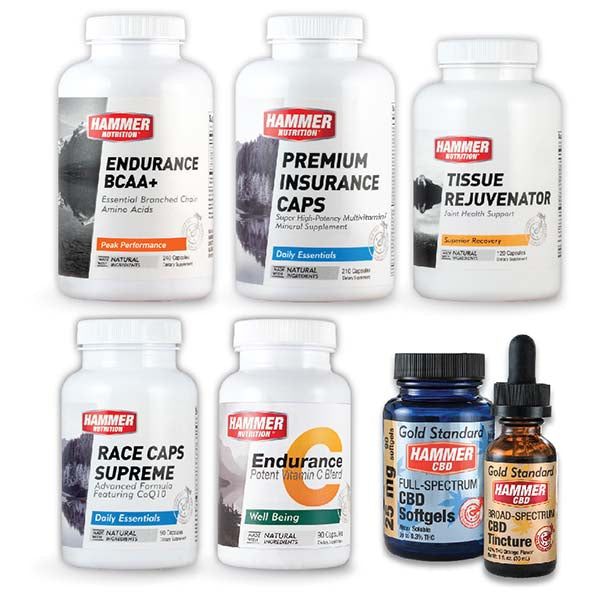
Dynamic defender of your immune system
BY STEVE BORN
For more years than I can recall, Brian has provided vitamin D supplements for all Hammer Nutrition staff members. Our kitchen and warehouse cupboards are stocked year-round with bottles of this most-impressive nutrient. While our use of vitamin D supplements diminishes a bit in the summer (because we get a lot of our D from the sun), from early October to late April/early May (most likely later now, because of the current situation), taking vitamin D supplements is a daily occurrence.
And for good reason—as long as I’ve studied nutrients and nutritional supplementation (coming up on 35 years now), I can’t think of any nutrient that plays more roles in human health than vitamin D. Magnesium is up there as well—and I’ll discuss this mineral a bit later—but the gold medal winner for “how many beneficial effects does a nutrient have for humans?” is vitamin D.
Space limits listing all of the roles that vitamin D plays in the body, but it’s fair to say that since nearly every bodily cell and tissue has vitamin D receptors, they all require vitamin D to function properly [1, 2]. In regards to the immune system—a primary focus for all of us these days—vitamin D is very much a “front line defense” nutrient.
A portion of the conclusion from one piece of vitamin D/immune system research states: “Vitamin D has important functions beyond those of calcium and bone homeostasis which include modulation of the innate and adaptive immune responses. Vitamin D deficiency is prevalent in autoimmune disease. Cells of the immune system are capable of synthesizing and responding to vitamin D.” [3]
Commenting on other vitamin D/immune system research [4], Dr. Richard Mellanby writes: "Low vitamin D status has long been implicated as a significant risk factor for the development of several autoimmune diseases. Our study reveals one way in which vitamin D metabolites can dramatically influence the immune system."
Lastly, highly-regarded vitamin D expert, Dr. Richard F Holick, states that vitamin D “is capable of regulating a wide variety of genes that have important functions in regulating cell growth, modulating immune function and cardiovascular health. Epidemiologic evidence and prospective studies have linked vitamin D deficiency with increased risk of many chronic diseases including autoimmune diseases, cardiovascular disease, deadly cancers, type II diabetes and infectious diseases.” [2]
By now, it should be clear that vitamin D is essential for basically all aspects of health, including proper immune system function. There is a wide range of how much vitamin D one needs to take daily to maintain optimal levels—a vitamin D, 25-Hydroxy blood test is the only way to know for sure—but the general consensus is 2000 IU - 4000 IU daily.
Each capsule of Premium Insurance Caps contains approximately 71.5 IU of vitamin D, so a typical four-to-six capsule daily dose will supply you with just about 285 IU – 429 IU of vitamin D. Augmenting with additional amounts can easily be done via a stand-alone vitamin D supplement, most of which are extremely affordable and readily available. Most vitamin D supplements (sold as vitamin D3, or cholecalciferol) are produced from lanolin, which is derived from sheep’s wool. There are also vegan-friendly vitamin D supplements, the vitamin D3 being derived from lichen.
NOTE: Supplements that currently use the “IU” (International Unit) measurement will be switching over to “mcg” (microgram). Each IU of vitamin D is equal to 0.025 mcg, so 25 mcg of vitamin D is the same amount as 1,000 IU.
Don’t forget the magnesium!
To get the full value of the plentiful benefits from vitamin D, you need sufficient amounts of magnesium. This is because magnesium activates the enzymes involved in vitamin D metabolism. In one study, researchers stated that it is “essential to ensure that the recommended amount of magnesium is consumed to obtain the optimal benefits of vitamin D.” [5]
Another study [6] indicates that magnesium also optimizes vitamin D “status” in the body—increasing it in people with deficient levels and lowering in people with too-high levels. This, researchers believe, is vital because people synthesize vitamin D differently; in some individuals, vitamin D levels were found to not rise even after being given high doses of the vitamin. Using magnesium in vitamin D studies, and via magnesium’s “raising/lowering vitamin D levels as needed” properties, more-reliable conclusions can be achieved in research regarding conditions related to vitamin D levels. Additionally, thanks to magnesium’s ability to balance and optimize vitamin D levels, more people will be able to enjoy the plethora of benefits that come from optimal—not too low, not too high—blood levels of this all-important vitamin.
With each capsule containing 100 mg of magnesium from five highly bioavailable forms, Essential Mg is the easy way to provide your body with this “necessary for vitamin D utilization” mineral.
REFERENCES:
[1] Holick MF. Vitamin D: evolutionary, physiological and health perspectives. Curr Drug Targets. 2011 Jan;12(1):4-18.
[2] Holick MF. Vitamin D: a d-lightful solution for health. J Investig Med. 2011 Aug;59(6):872-80.
[3] https://www.ncbi.nlm.nih.gov/pmc/articles/PMC3166406/
[4] Louise Saul, Iris Mair, Alasdair Ivens, Pamela Brown, Kay Samuel, John D. M. Campbell, Daniel Y. Soong, Nadine Kamenjarin, Richard J. Mellanby. 1,25-Dihydroxyvitamin D3 Restrains CD4 T Cell Priming Ability of CD11c Dendritic Cells by Upregulating Expression of CD31. Frontiers in Immunology, 2019; 10 DOI: 10.3389/fimmu.2019.00600
[5] https://jaoa.org/article.aspx?articleid=2673882
[6] Magnesium status and supplementation influence vitamin D status and metabolism: results from a randomized trial; Qi Dai Xiangzhu Zhu JoAnn E Manson Yiqing Song Xingnan Li Adrian A Franke Rebecca B Costello Andrea Rosanoff Hui Nian Lei Fan Harvey Murff Reid M Ness Douglas L Seidner Chang Yu Martha J Shrubsole; The American Journal of Clinical Nutrition, Volume 108, Issue 6, 1 December 2018, Pages 1249–1258, https://doi.org/10.1093/ajcn/nqy274









2 comments
I forgot to say, “Great article!” I particularly like the part about how “magnesium also optimizes vitamin D ‘status’ in the body—increasing it in people with deficient levels and lowering in people with too-high levels.”
Message: Steve- You mentioned the name Dr. Richard F. Holick as a vitamin D expert. You clearly were referring to Michael F Holick, MD PhD who is arguably the most prominent researcher in the vitamin D world.
Answer:
Thank you kindly for correcting my error, I was going from memory and should have double checked. At least I got the last name right! SB